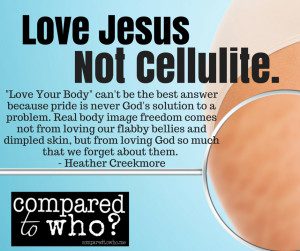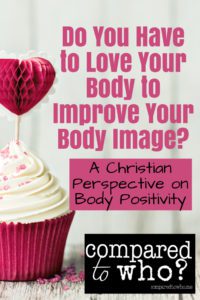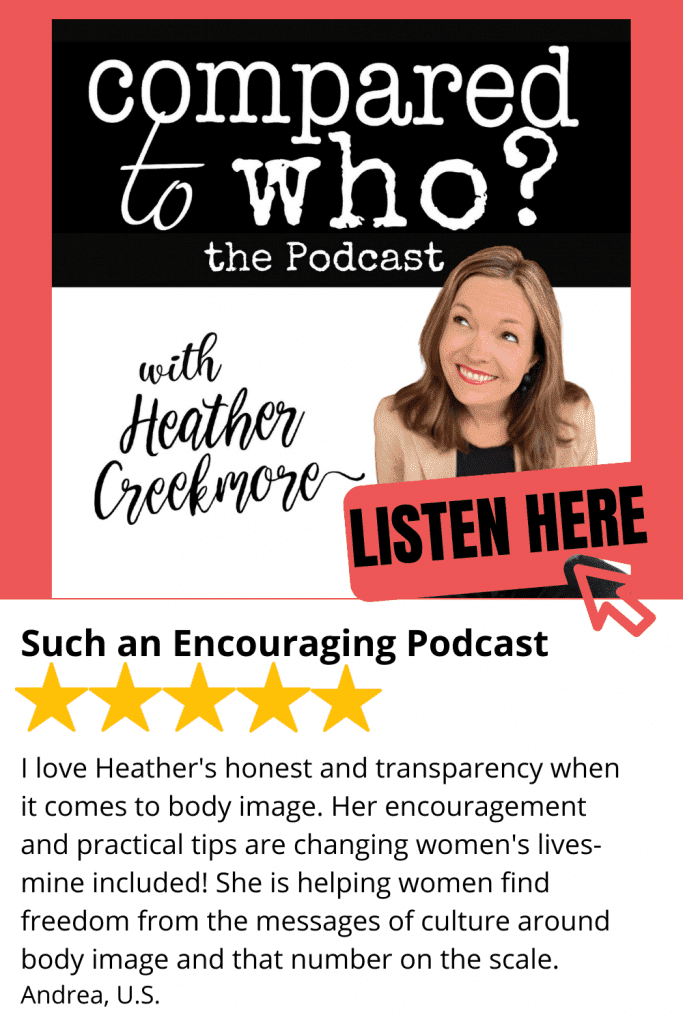Stunned, I sat in front of my television. I could not believe what I just witnessed. The Today show featured a fashion consultant named Gok Wan who said he had discovered the answer for women with body image issues.
Are you ready for this?
He invites women to his studio, has them strip in front of a mirror, then stare at their reflections until they decide to like what they see. After they wave, “Yoohoo…Gok, I accept my body now!” he dresses them fashionably. Gok believes women must feel good about what’s underneath the clothes before the clothes matter. Sure, why not?
I could not make this up. (Here’s the evidence.)
Gok says,”it’s a multi-step process: Looking, learning and loving by embracing the body you’ve got, imperfections and all.”
As a woman who battled her own body image for decades, I can’t imagine how standing at a mirror (with Gok in the room!) would help me. My home contains plenty of looking glasses. Sometimes, I even glance in one before I get in the shower. I usually regret this.
I won’t sign up for Gok’s express ride to body image freedom anytime soon. (Sorry, Gok!)
Though Gok and I disagree on just about everything, we somehow agree on one specific principle. It’s a big thing. (It’s pretty much Gok and I against the world on this one.) That is: You don’t have to love your body.
What?
It’s blasphemy in some circles to make such an outrageous statement, but I’ll stand by it. Gok has his reasons. I have mine.
Some Background on Body Positivity
The “love your body” movement also answers to the name “Body Positivity.” Its mission: make people proud of their bodies. In a four-second scan of this category on Huffington Post you can find articles ranging from “I Strip Because Too Many Women Hate Their Bodies” to “Saying ‘I Do'” to my Body” to “Mom Embraces StretchMarks.”
Their goal is to help the millions who struggle with body image to “overcome conflicts with their bodies to lead more productive lives.” (From the bodypostive.org website) They’ve made helpful contributions to our culture’s struggle such as eliminating the term “bikini body” from our vernacular. They produce memes to encourage us that we are all acceptable, no matter what our weight, shape or bra size.
That sounds like Compared to Who? right? How could I argue with such a noble cause? I’m all about helping women be more productive. We are all acceptable, aren’t we?
This is where it gets tricky. Because it sounds so close to the truth.
First, let’s settle the value question. No matter what the size tag reads in your jeans, thanks to Jesus, we are all accepted! Yes!
Women do need to be freed from body image worries to be more productive–to live out their God-given purpose. Double Yes!
But, the Body Positivity method of helping women “overcome” body image issues often leads women down a different, but equally dangerous path.
Christian Perspective on Body Positivity
Have you heard the Toby Mac song, “Lose my Soul?” There’s one line that always catches my attention, “And I pray I’m an artist who rises above, the road that is wide and filled with self-love.”
Did you read those last two words? Self-love. Love yourself, accept yourself, find what you appreciate about yourself. You will feel better about you if only you stop and meditate on how wonderful you are.
Our celebrity idols shout kind-sounding ideas from the stage. Talk show hosts applaud and tear up when women proclaim they’ve determined to love themselves. You may have even heard that you can’t love anyone else until you first learn to love yourself.
But friends, it’s not biblical. In fact, self-love reeks of something that Jesus told us to avoid. It is more rightly labeled pride (with a touch of vanity!). Thinking more of yourself, loving yourself, focusing on your own greatness. . .the Christian life calls us to something very different.
As Christ followers, we are taught to repent of that pride, to kill it. Not rename it and label it the answer to our body image problem. (I wrote more about how this here.)
I know many well-meaning Christian women who have adopted this slogan. They work to “love” their bodies, but they struggle to do it consistently.
This concerns me on three fronts. First, asking the woman who struggles to “like” her body to “love it” resembles you requesting I write you a check for a million dollars. I’d love to give you the cash, really I would, but I don’t have the resources to do so. Women who struggle with a broken view of their body often don’t have the internal resources to simply change their minds about their appearance. Inspiring pep talks can encourage them to “love” it for a few days or weeks, but they often retreat back to their old thought patterns.
Second, we are to walk humbly with our God. Beaming with pride over your body contradicts this type of humility. Besides, pride can never be God’s solution out of a body image problem. He can’t contradict his character that way.
Third, the same media telling you that you should “love” yourself, just as you are sells you billions in products to make you look different. Even the well-meaning Gok has a new line of shape wear. Tell me how you a woman she’s perfect–just as she is–and then suggest she wear a girdle so tight it gives her irritable bowel syndrome? Am I the only one confused by these mixed messages?
Why My Goal Isn’t to Help You Love Your Body.
As I read my Bible, we have to love Jesus and love others. That’s it. End of the list.
There’s no biblical mandate to love cellulite, cankles, bra strap flab, or stretch marks. None. These are signs we live in a fallen world. Loving them, hash-tagging a photo of your thigh dimples #Ilovemybody strikes me as ridiculous.
We don’t have to love our physical forms. Rather, we have to care for our bodies or be “good stewards” of them. Neither should we “despise” our bodies, body negativity is not an appropriate response either. We were made in God’s image, no matter what our size, color or build and our bodies are a good gift from God. There is no shame or condemnation in Christ (I wrote about how we are free from body shame here). First Corinthians chapter six further clarifies that the role of our body is to host the Holy Spirit. We serve as His temples. There is a standard of maitenance and self-care implied.
But, when the temple becomes the object of worship, body image fractures. Likewise, self-love, self-esteem, or “love your body” solutions, tend to turn our affections away from the One who is worthy of worship. Instead, of using the temple to worship, we worship the temple.
Is Your Body an Idol or an Alter?
For decades I worked to “perfect” my body. I dieted. I exercised. I wanted to make my body as attractive as possible. All to glorify God, right?
Hardly.
I’ll come clean. My motives were to draw worship to me. Not that I expected anyone to literally bow in my presence. But, I knew a woman who looked really good would draw two types of worship: the attention of men and the accolades (and sometimes envy) of other women.
I’m not proud of this.
It all sounds so shallow, but my reasons for pursuing body perfection weren’t really superficial. At all. In truth, I just wanted to be loved. I wanted to be accepted. I desired to be known. And, I believed that looking really great, physically, provided the only route to having these needs met.
I believed a lie. One that told me more beauty would save me. A better body would give me all the happiness, joy, and peace I longed for.
They call that: idolatry. And, when it happens in the context of perfecting our bodies in order to feel “saved” we call that body image idolatry.
I had to repent, name it as sin, and ask God to forgive me for the ways that I sought to have others worship my temple instead of using my temple to worship God.
So I ask you: Is your body an idol or an alter?
Do you seek to use your body to worship God or do you seek worship for your body?
Do you believe that a better body will save you? Or, can you lay down your body image–release your desire to have a better look–and put it on the alter in surrender to God’s purpose for your life?
Please don’t hear any condemnation in those questions. I may have never admitted aloud that I thought my body would save me, but the truth is, I still battle a voice in my head that tells me I’d feel a whole lot more freedom and joy if I weighed less and had better hair.
But, when you settle the answers to these questions in your heart, you’ll find your struggle starts to diminish. Like Roman 6 explains more broadly, it’s not that we then ignore or abuse our body, rather we understand that–in Christ–we live for something greater. Our body was intended for so much more than culturally acceptable aesthetic beauty.
One Goal
My goal at Compared to Who is not to help you love your body. Rather, in our age of self-awareness, I want to encourage Christians to practice something different. That is: self-forgetfulness.
When I can take my mind, my thoughts, and my focus off of me, I find new freedom. The pressure to “love my body” evaporates while I discern the unique purposes God intended for my body to fill. I can also practice humility. No longer worried about being the prettiest woman in a room, I am freer to love others, serve others, and to stop comparing myself to others.
I want us to have honest conversations about the real struggles we have in this arena and encourage each other to surrender. Stop trying to be thin enough, pretty enough, firm enough . . .and surrender to the fact that we actually are not enough on our own. We need Jesus. Only He is enough.
Fortunately, we don’t have to love our bodies more to find the freedom he offers. We only have to love and obey Him.
[mc4wp_form id=”4141″]








Thanks so much for this! I have been against self love as a Christian for so long, it is so great to hear someone who shares my views! I believe that if one is truly christian, then they believe that God loves and accepts them fully for who they are, therefore, there is no need to even address the problem of self love. The only love that will fulfill us and help us escape our self hatred is God’s love, which is free and abundant! What an amazing message. Self love calls us to be able to love and accept ourselves before we should love others- this is so selfish! If I should be focusing on loving myself, why should I even look to help and love other people, if it doesn’t benefit me? We are creating a selfish world by endorsing self love, thank you for revealing the truth in this so commonly accepted idea!
Exactly!!!! 🙂 Thanks for chiming in!!!
I agree with this article on many points. However, I would have phrased this paragraph differently;
“There’s no biblical mandate to love cellulite, cankles, bra strap flab, or stretch marks. None. These are signs we live in a fallen world.”
Who is to say that Eve didn’t have cellulite and flab in The garden of Eden? Who is to say that she wouldn’t have had stretch marks and stretched skin had she given birth before the fall? We weren’t there, we don’t know what she looked like. The Bible does mention beauty but it does not outline what makes a woman beautiful and what makes her ugly. To refer to these things as so would also be unbiblical. I would not argue that these things are present on our bodies because we live in a fallen world. Instead, I would argue that we have been taught to hate these things about our bodies, to interpret them as ugly because of the fall. That’s is all.
Thanks for your comment. I see where you are coming from. But I do think we know enough about the way the environment changed before and after the Fall (really after Noah and the flood), the life spans of people, and even how people aged (they were having babies decades later than we can!) to assume that “pre-fall” bodies probably did look somewhat different. But, I’m certainly with you in terms of the truth that people only reject things like “Flab” because our culture tells them to. (Centuries ago that “flab” was a sign of wealth and women wanted to have it!!!)
My larger point is not that we have to “reject” them – rather that we don’t have to turn to pride and do ridiculous “I love my stretch marks” photos to find body image freedom. If one wants to post photos of their stretch marks with that sentiment, they can. But, that’s not the path to body image freedom. 🙂
Right on, Mrs. Creekmore. I used to blog about body positivity, but your post on it made me shift to body neutrality instead. As a Christian (a Catholic), I felt that being neutral in appearance clicks more with me than the “love your body” thing. I’m in the process of writing a blog about it.
Thanks! So glad it resonated with you. God certainly made our bodies in an incredible fashion. But, he deserves ALL the worship! 🙂 Thanks for your comment! Hope to read your post!
Great post Heather! Thanks
Thanks, Carole!
Firstly, I want to say thank you for your website. I find it very inspirational and it so often speaks directly into how I’m feeling. Body image is something that I think most women struggle with and I have felt very convicted over the last few years to lay it at the throne and,instead, to focus more on who God is and less on me. However, in this time, one verse that really stood out to me was Mark 12 v 31 where Jesus says that we are to ‘love others as yourself’. This made me realise that loving myself is important as if I cannot truly love myself I won’t be able to pass this love into others. I agree that being self-obsessed is not the answer but I believe that I am called to love myself, not for how I look or for what I do, but because I am fearfully and wonderfully made, in the image of God and because Jesus died for me. This leads me to see my true value. My body is not ‘perfect’ in the way the world might dictate but God gave me this body and I am thankful for every part of it.
Thanks so much Kate for that comment! It sounds like you have arrived at a healthy view of your value in Christ and that’s awesome.
I’m familiar with the Mark verse and its common interpretation is exactly what you stated–you have to love yourself first. I ALWAYS believed this too! But, recently I’ve done some study of the Greek and this verse in original form (through the commentaries of those much smarter than I am!) and it was very eye opening. I think that verse is better interpreted that self-love is implied, not directed. The scripture assumes we already have enough self-love. Our modern interpretation is based heavily in pop psychology, but likely not close to what Mark was trying to convey in the passage. (To which the woman who struggles to like herself says, “Really? I already have enough self love? I doubt it!”)
Another point that convinced me I interpreted that verse wrong: Jesus spent his time teaching us to lay down that self-love, not to increase it. There are multiple verses on how we should love others, love God, etc… but no other verse on loving ourselves. Not a single one!! This fact alone made me question its importance.
It’s a big, old tricky issue for sure! One I’ve been studying for a few years and trying to make sense of. Some resources that have helped me include a book called “The Freedom of Self Forgetfulness” by Tim Keller which helps lay some of this out but there’s also a book (one that really challenged me) called “When People are Big and God is Small” by Ed Welch that shed new light on the subject of insecurity and when we feel like we “don’t like” ourselves. I don’t know if you are interested in reading more, but I thought I’d throw that out there just in case! 🙂 I’m really thankful you brought that up though, I know many women probably had the same specific thought. 🙂
Thanks for the reply. I’ll look out for those books.
Heather,
I know that this is an old comment chain, but I figured I would bring some things up. You say that the interpretation of Mark12:31 as a directive of self-love is heavily grounded in pop psychology, but there are some prominent theologians who are very much not grounded in pop psychology that address self-love, and even love of one’s own body.
Augustine of Hippo, in “On Christian Doctrine” takes self-love to be something universal — even among those who seek to abuse the body. His viewpoint is a very holistic one, seeing humanity not as a soul within a body, but as wholly body and soul (so do more ancient theologians like Irenaeus, and more modern ones like John Wesley. The idea comes out of ancient Judaism). He doesn’t address specifically issues of self-image and comparison, but he does have interesting things to say in Book I, chapters 22-27. He discusses the verse from Mark, as well as Ephesians 5:29. In particular, chapters 26-27 address the Mark verse and what the order of love should look like in a Christian, respectively.
About 800 years later, Thomas Aquinas wrote the Summa Theologiae. He talks a good bit about self-love in Book 2 Part 2 Question 26 Articles 1-6. He draws on Augustine, but has a different point of view on the Mark verse. He does agree that we should have self-love regarding the body, but out of an “overflow” from happiness — i.e. communion with God. He sees that self-love of the soul is necessary for the perfection of the virtue of charity. Aquinas also writes about an “order of charity,” i.e. love, that mirror’s Augustine’s.
I think that both resources provide a foundation for Christian self-love that is still totally submissive to Christ, and not based on any sort of self-centeredness or concern for appearance.
newadvent.org has online texts for both of these works, if you’d like to check them out. The links in the top right corner of the home page can get you there quickly.
I really appreciate this website as a whole — I think that you’re doing great work in putting this together.
Thanks for that N . . .I think the term is tricky because of semantics. In Augustine and Aquinas’ era (though I haven’t researched this specifically) self-love would be defined differently than the way it’s been defined by the body positivity movement. I’m not saying a Christian shouldn’t have a healthy respect and admiration for self that is submitted to Christ or out of an overflow of love –generated by Christ–in the heart. Rather, I’m specifically addressing a movement that encourages “more self love” as the way out of body image issues. Body positivity preaches that if you love your body more, you’ll find freedom. And, the catalyst for this piece is to encourage women that improperly ordered loves–focusing on self-love–will not be the way out. Semantics make this issue very messy . . .as with most issues . . .language can be co-opted and then defining terms because the key to having any kind of reasonable discussion. So, perhaps I should have added the disclaimer, “Self love, as you’ve read and heard about it on Oprah and in Fitness magazines, is not a biblical concept.” Hopefully that clarification helps bridge any divide between us.
It seems like you all may be talking about the same thing. Like mentioned above, the problem may just be semantics. I don’t think it matters whether you call it self love, body positivity, or self acceptance. As long as the goal is the same, to have God be the focus of our lives rather than our bodies. If calling it self love helps remind you that self hate is just as dangerous and can lead you away from God just as much as pride. Then I’m all for it.
“Do unto others as you would have them do unto you” and “love your neighbor as yourself” has nothing at all to do with “loving yourself”. Those scripture passages were based on doing for someone what you would do or want to have done for yourself: kindness, love, forgiveness, faithfulness, mercy, peacemaking, comfort, compassion, patience. These virtues can be expressed verbally or through actions.
As you can see they have no connection to “loving yourself”, are not motivated by or centered upon “self love”.
They are the inward outpouring of Christ’s love.
Heather thank you for this! You say so much that I have been thinking for years and so eloquently put it into words. God has blessed you tremendously with your convictions and your writing ability. I cannot get enough of your articles they are such a blessing to me. I’ve struggled with eating disorders my whole life and major body image idolatry! I too got my degree in exercise physiology and nutrition just to pursue more of my “passion” ie addiction. Although now “recovered”, beyond blessed to be a mother of 3, and passionately wanting to be more like Jesus, it is still a daily battle. The battle is just different now with new struggles as we age and after we have kids I’ve struggled a lot with wanting to be a fit mom, looking for praises for how quickly I’ve recovered after having a baby. I’m not proud of this but the flesh is always looking for ways to stroke itself. I’m totally on board with you no matter how skinny we become we still will not love our bodies or even like them. Or we shouldnt. The only true Freedom comes from self-forgetfulness which I am totally passionate about and I’m so glad you are writing about it. Even the world’s best efforts at trying to comfort us with self-love are not biblical and elicit Pride in our hearts. Anyways I’m grateful for you and just wanted to write and tell you that!!
Oh Jennifer, thank you so much for sharing all of that. It really encourages me. And, I get the new battle for sure. Oh how proud I was to lose the baby weight after the first few (the last two left me no reason to be prideful – haha. Children are sanctifying!) But self-forgetfulness… Remembering “Christ alone” can satisfy. That’s my prayer for all of us! Thanks so much for your kind words.
Thank you so much for this, it is so what I needed to hear today. I have tried and tried the past year to learn to love (or even like) my body, but now I realize that I was focusing on completely the wrong things. “We only have to love and obey Him.” Amen!
So glad to hear that! We obviously shouldn’t despise our bodies…but the mandate to love becomes an undue burden! It’s Christ alone…not Christ and body love, right? 🙂
Right! 🙂 Taking care of my body and myself, but not idolizing beauty. However, it is difficult to find the balance between the two sometimes…